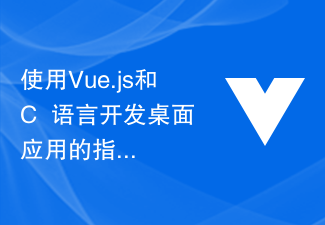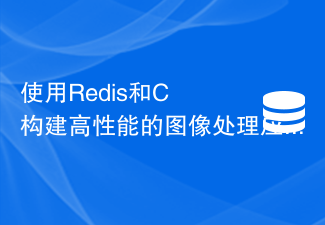In C, the rvalue reference parameter allows a function to obtain a reference to a temporary object without creating a copy. The advantages include avoiding unnecessary copies, improving performance and readability. The syntax is void func(T&& param). Note that rvalue references can only be bound to temporary objects and can only be used within functions.

Usage of C function rvalue reference parameter
In C, the rvalue reference parameter allows the function to obtain a reference to a temporary object. without creating a copy of it. This improves performance and readability.
Syntax:
void func(T&& param);
Among them:
-
&&represents rvalue reference -
paramis Function parameter -
Tis of type
Advantages:
- Avoid unnecessary copying
- Improve performance
- Improve code readability
Practical case:
Consider a string that converts to uppercase Function:
#include <iostream>
#include <string>
using namespace std;
void toUpperCase(string&& str) {
for (char& c : str) {
c = toupper(c);
}
}
int main() {
string input = "hello";
toUpperCase(input);
cout << input << endl;
return 0;
} In this case, when passing input to toUpperCase, there is no need to copy the string as it is a temporary object. This function will modify input directly, thus avoiding unnecessary overhead.
Output:
HELLO
Notes:
- Only temporary objects can be bound to rvalue reference parameters.
- rvalue references cannot be bound to existing variables.
- rvalue references can only be used in functions, not as class members.
The above is the detailed content of Usage of C++ function rvalue reference parameters. For more information, please follow other related articles on the PHP Chinese website!
 Windows 11 系统下的五款最佳免费 C++ 编译器推荐Apr 23, 2023 am 08:52 AM
Windows 11 系统下的五款最佳免费 C++ 编译器推荐Apr 23, 2023 am 08:52 AMC++是一种广泛使用的面向对象的计算机编程语言,它支持您与之交互的大多数应用程序和网站。你需要编译器和集成开发环境来开发C++应用程序,既然你在这里,我猜你正在寻找一个。我们将在本文中介绍一些适用于Windows11的C++编译器的主要推荐。许多审查的编译器将主要用于C++,但也有许多通用编译器您可能想尝试。MinGW可以在Windows11上运行吗?在本文中,我们没有将MinGW作为独立编译器进行讨论,但如果讨论了某些IDE中的功能,并且是DevC++编译器的首选
 C++编译错误:未定义的引用,该怎么解决?Aug 21, 2023 pm 08:52 PM
C++编译错误:未定义的引用,该怎么解决?Aug 21, 2023 pm 08:52 PMC++是一门广受欢迎的编程语言,但是在使用过程中,经常会出现“未定义的引用”这个编译错误,给程序的开发带来了诸多麻烦。本篇文章将从出错原因和解决方法两个方面,探讨“未定义的引用”错误的解决方法。一、出错原因C++编译器在编译一个源文件时,会将它分为两个阶段:编译阶段和链接阶段。编译阶段将源文件中的源码转换为汇编代码,而链接阶段将不同的源文件合并为一个可执行文
 C++编译错误:无法为类模板找到实例化,应该怎么解决?Aug 21, 2023 pm 08:33 PM
C++编译错误:无法为类模板找到实例化,应该怎么解决?Aug 21, 2023 pm 08:33 PMC++是一门强大的编程语言,它支持使用类模板来实现代码的复用,提高开发效率。但是在使用类模板时,可能会遭遇编译错误,其中一个比较常见的错误是“无法为类模板找到实例化”(error:cannotfindinstantiationofclasstemplate)。本文将介绍这个问题的原因以及如何解决。问题描述在使用类模板时,有时会遇到以下错误信息:e
 iostream头文件的作用是什么Mar 25, 2021 pm 03:45 PM
iostream头文件的作用是什么Mar 25, 2021 pm 03:45 PMiostream头文件包含了操作输入输出流的方法,比如读取一个文件,以流的方式读取;其作用是:让初学者有一个方便的命令行输入输出试验环境。iostream的设计初衷是提供一个可扩展的类型安全的IO机制。
 c++数组怎么初始化Oct 15, 2021 pm 02:09 PM
c++数组怎么初始化Oct 15, 2021 pm 02:09 PMc++初始化数组的方法:1、先定义数组再给数组赋值,语法“数据类型 数组名[length];数组名[下标]=值;”;2、定义数组时初始化数组,语法“数据类型 数组名[length]=[值列表]”。
 使用Vue.js和C++语言开发桌面应用的指南Jul 29, 2023 am 09:59 AM
使用Vue.js和C++语言开发桌面应用的指南Jul 29, 2023 am 09:59 AM使用Vue.js和C++语言开发桌面应用的指南随着互联网的发展,前端技术也在不断更新和进步。而Vue.js作为一种轻量级、高效、易用的前端框架,在开发Web应用方面具有很大的优势。然而,在一些特定的场景中,我们可能需要开发一些更加复杂的桌面应用程序,这时候就需要结合C++语言来实现一些底层功能。本文将会介绍如何使用Vue.js和C++语言开发桌面应用,并提供
 使用Redis和C++构建高性能的图像处理应用Jul 29, 2023 pm 08:36 PM
使用Redis和C++构建高性能的图像处理应用Jul 29, 2023 pm 08:36 PM使用Redis和C++构建高性能的图像处理应用图像处理是现代计算机应用中的重要环节之一。由于图像处理的复杂性和计算量大,如何在保证高性能的同时提供稳定的服务是一个挑战。本文将介绍如何使用Redis和C++构建高性能的图像处理应用,并提供一些代码示例。Redis是一个开源的内存数据库,具有高性能和高可用性的特点。它支持各种数据结构,如字符串、哈希表、列表等,同
 浅析怎么下载安装VSCode历史版本Apr 17, 2023 pm 07:18 PM
浅析怎么下载安装VSCode历史版本Apr 17, 2023 pm 07:18 PMVSCode历史版本的下载安装 VSCode安装 下载 安装 参考资料 VSCode安装 Windows版本:Windows10 VSCode版本:VScode1.65.0(64位User版本) 本文


Hot AI Tools

Undresser.AI Undress
AI-powered app for creating realistic nude photos

AI Clothes Remover
Online AI tool for removing clothes from photos.

Undress AI Tool
Undress images for free

Clothoff.io
AI clothes remover

AI Hentai Generator
Generate AI Hentai for free.

Hot Article

Hot Tools

WebStorm Mac version
Useful JavaScript development tools

DVWA
Damn Vulnerable Web App (DVWA) is a PHP/MySQL web application that is very vulnerable. Its main goals are to be an aid for security professionals to test their skills and tools in a legal environment, to help web developers better understand the process of securing web applications, and to help teachers/students teach/learn in a classroom environment Web application security. The goal of DVWA is to practice some of the most common web vulnerabilities through a simple and straightforward interface, with varying degrees of difficulty. Please note that this software

Zend Studio 13.0.1
Powerful PHP integrated development environment

Dreamweaver Mac version
Visual web development tools

Notepad++7.3.1
Easy-to-use and free code editor






